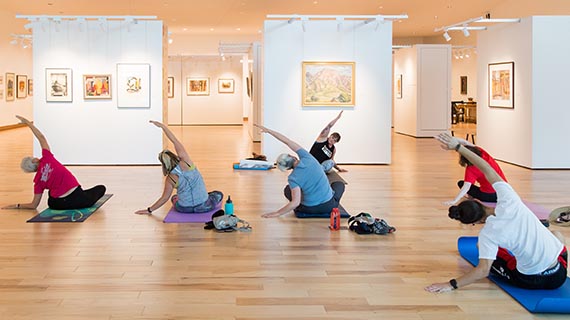Skills for Navigating and Responding to COVID-19
Posted: August 13, 2021 | Author: Southern Utah University | Read Time: 5 minutes
 Navigating your response to COVID-19 can feel overwhelming. We are constantly being given new instructions and information and with the frequent changes being made to planned events and familiar formats for interaction, it can be difficult to feel in touch with reality and capable of making the right decisions.
Navigating your response to COVID-19 can feel overwhelming. We are constantly being given new instructions and information and with the frequent changes being made to planned events and familiar formats for interaction, it can be difficult to feel in touch with reality and capable of making the right decisions.
COVID-19 Survival Guide
In response to this confusion, Southern Utah University’s Counseling and Psychological Services (CAPS) created the COVID-19 Survival Guide, which helps students to better make sense of their situation and determine how to best respond to their emotions and the world around them. By following the FACE COVID formula below, students will be better prepared to handle the challenges this constantly changing crisis may push in their direction.
F - Focus on what’s in your control
A - Acknowledge your thoughts and feelings
C - Come back into your body
E - Engage in what you’re doing
C - Committed action
O - Opening up
V - Values
I - Identify resources
D - Disinfect and distance
F - Focus on what’s in your control
From the CAPS COVID Survival Guide, the single most useful thing anyone can do in any type of crisis – COVID-19 related or otherwise - is to focus on what’s in your control.
We are being faced with unprecedented times. It is easy to feel out of touch with the world around you and to be caught off guard by the onslaught of information coming at us at unparalleled speed. In this time where many feel helpless and scared, the best thing we can do is focus on the things we can control. Despite how overwhelming the world can be, there are always things we have control over.
“The reality is, we all have far more control over our behavior than we do over our thoughts and feelings. So our number one aim is to take control of our behavior - right here and now - to respond effectively to this crisis.”
A - Acknowledge your thoughts and feelings
Take the time to acknowledge what you are feeling without judgment. Often, we view our emotional responses as something negative and condemn ourselves for feeling things, whether that be scared, anxious, overwhelmed, or depressed.
The COVID Survival Guide advises students to take the stance of a curious scientist, observing what’s going on in their inner world. Look at thoughts, feelings, and emotions as something to be observed and understood.
C - Come back into your body
While continuing to acknowledge your feelings, take time to feel grounded in your own body. Use these techniques to feel centered and connected with your physical body.
- Slowly pushing your feet hard into the floor
- Slowly straightening up your back and spine; if sitting, sitting upright and forward in your chair
- Slowly pressing your fingertips together
- Slowly stretching your arms or neck, shrugging your shoulders
- Slowly breathing
E - Engage in what you’re doing
Once you’ve taken the time to acknowledge your thoughts and feelings and to center yourself in your body, refocus your attention on the activity at hand. There are a number of ways to engage in what you’re doing, including the following steps:
- Look around the room and notice five things you can see
- Notice three or four things you can hear
- Notice what you can smell or taste
- Notice what you are doing
- End the exercise by giving your full attention to the task or activity at hand.
C - Committed action
Once you have followed the FACE formula, it is easier to do things that truly matter to you. Try taking some time to ask yourself a few of the following questions.
- What are simple ways to look after yourself, those you live with, and those you can realistically help?
- Can you comfort and soothe someone who is sick? Or, in the most serious of cases, nurse them and access whatever medical assistance is available?
- While staying at home, through self-isolation, forced quarantine, or social distancing, what are the most effective ways to spend that time?
O - Opening up
Opening up means making room for difficult feelings and being kind to yourself. As we talked about in acknowledging feelings and thoughts, it can be difficult to allow yourself to feel emotions without judgment. Try to treat yourself the way you would treat a loved one going through the same emotions. Practicing self-kindness is an essential coping technique, especially for those who find themselves in caregiver roles.
V - Values
Your values are what should guide your committed actions. Things like love, respect, patience, courage, honesty, caring, openness, and kindness should be at the center of your intentions as you respond to this crisis. Try asking yourself the following questions.
- What do I want to stand for in the face of this crisis?
- What sort of person do I want to be as I go through this?
- How do I want to treat myself and others?
Letting these things guide your actions will help you to feel centered and motivated, as well as enable you to better interact with your environment as you learn to let your values guide your interactions with the outside world.
I - Identify resources
Resources can be anything from health professionals and emergency services to friends, family, and neighbors you can trust. Reach out online and in-person for support and, if you are able to, offer that same support to the people around you.
Another important resource is a reliable and trustworthy source with which you can check for updates and information regarding the current crisis. The World Health Organization’s (WHO) website is there to help people get up-to-date information regarding COVID-19.
D - Disinfect and distance
Finally, don’t forget to follow the WHO's guidelines to keep yourself and those around you safe and healthy. Disinfect your hands regularly and practice as much social distancing as physically possible. For more information about how to disinfect and distance properly, visit the WHO’s website.
While social distancing makes it difficult to interact physically, there are many resources available that make it possible to connect with loved ones from afar.
SUU has also put together a guide for students interested in what COVID restrictions will be in place this fall, visit suu.edu/coronavirus for the most up-to-date information for campus.
SUU Counseling and Psychological Services provides a variety of services for both graduate and undergraduate students at SUU. Students are eligible for counseling services including individual, group, and couples counseling and workshops hosted by CAPS. If you have any further questions about the group or individual counseling meetings, contact CAPS directly.
This article was published more than 3 years ago and might contain outdated information or broken links. As a result, its accuracy cannot be guaranteed.
Tags: Coronavirus CAPS




